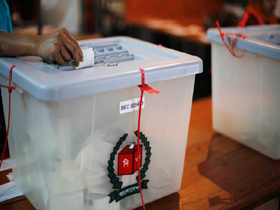Opposition BNP on Saturday called upon the government officials and employees to perform their duties neutrally and disobey the orders of any party or individual to involve in the unilateral election.
“We urge all the officials and employees of the republic to work impartially as the people of the country its servants. You don’t be used as the tool of any party or individual to fulfil its illegal desire,” said BNP joint secretary general Salauddin Ahmed.
In a video message from his hideout, the BNP spokesman also urged the Election Commission to postpone ‘the lopsided and farcical’ polls.
Mentioning that Awami League wants to hold a farcical election as it fears fair polls, he requested the country’s people to get united to ensure the fall of the current regime.
Salauddin said the Commonwealth, the EU, the UN and other important states and organisations have not yet decided to send election observers to monitor the government’s one-sided polls in Bangladesh.
“Even maximum election monitoring bodies and organisations registered with the Election Commission did not apply for observing the election. Besides, majority of the teachers expressed their unwillingness to discharge duties in the lopsided election.”
Earlier in the morning, the BNP-led 18-party alliance enforced its fresh spell of 72-hour road-rail-waterway blockade across the country at 6am demanding that the next national election be arranged under a non-party government, which is progressing amid stray incidents of violence.
The 72-hour blockade will end after 6am on Tuesday if it was not extended further unlike the previous two spells.
Meanwhile, in a statement on the first of the 72-hour blockade, Salauddin, on behalf of opposition leader Khaleda Zia, thanked the country’s people for what he said spontaneously observing the blockade programme.
He claimed that at least 217 opposition leaders and activists were injured in clashes with police and ruling party activists at different parts of the country while 326 arrested by law enforcers.
The BNP spokesman demanded the government release all the arrested opposition leaders and withdraw the ‘false’ cases filed against them.
Source: UNBConnect











Deputy Law minister Qamrul Islam , involved in criminal SKYPEGATE conspiracy said to Al-Hilal, “THEY ARE TRYING TO DELAY THE HANGING. WE ARE GOING TO HANG THE WAR CRIMINAL IRRESPECTIVE OF WHAT ANYONE SAYS OR DIES”
AS DEMANDED BY APOSTATE BLOGGERS, COMMUNISTS, ATHEISTS, ANARCHIST, AWAMI EXTREMIST & INDIAN RULERS COUNTRY’S LARGEST ISLAMIC PARTY’S DEPUTY SECRETARY GENERAL QADER MOLLA COULD NOT BE HANGED BEFORE THE EXPIRY OF THE TENURE OF THE CURRENT ANTI-ISLAMIC VINDICTIVE GOVERNMENT- Mamun Rashid, Dhaka:
Quader Molla has right for review of judgment
Dec 7, 2013. http://www.bdinn.com.Defence Statement Following The Judgement by the Appellate Division of the Supreme Court of Bangladesh in the Case of Abdul Quader Molla. MollaToday (5th Dec, 2013) the full judgment of the Appellate Division has been signed. We have already applied for a certified copy of the judgment. As soon as we obtain the certified copy we will file a review petition against the judgment in accordance with Article 105 of the Constitution. Mr. AQM has a right under the Constitution to file a review petition against the death penalty awarded by the Appellate Division. The constitutional jurisdiction of the Supreme Court to hear the review petition to be filed by Mr. AQM cannot be curtailed by law.We have heard that it is being claimed by the Attorney General’s Office that there is no scope for review of the judgment of the Appellate Division. That is not correct. The Constitution has given the Appellate Division the jurisdiction to hear review petitions. According to the settled principle of law laid down by the superior courts, in a democratic country with an independent judiciary, the jurisdiction of the Supreme Court cannot be readily inferred to have been taken away. Moreover, it is for the Supreme Court to decide whether it has the jurisdiction to hear a matter. The Appellate Division will have to decide whether a review petition filed against its judgment under the ICT Act is maintainable or not.
In the recent past, in AQM’s case,the question arose whether the Government’s appeal against the life sentence (the Government was seeking a death penalty) was maintainable or not. The Appellate Division heard lengthy arguments as to the maintainability of the appeal filed by the Government and even appointed amicus curiae on this question. Mr. AQM stands in a better position today because in our opinion, his right of review is guaranteed under Article 105 of the Constitution.And this is for the first time that the issue of the scope of review of a judgment of the Appellate Division under the ICT Act has been raised. Maintainability of a review petition is a question of law. It is for the Appellate Division and Appellate Division alone to decide whether it has the jurisdiction to hear a review petition. It is a principle of law settled by the superior courts of America, United Kingdom, Bangladesh, India and Pakistan that when the question of jurisdiction of the superior courts is raised, the superior courts themselves decide the issue after hearing both sides. And there is no reason why in AQM’s case there should be a departure from this settled principle.
If AQM’s review is dismissed either on merit or on the point of jurisdiction, then and only then the question of implementation of the verdict would arise. And in that case, the authorities would be under an obligation to follow the Jail Code. In an interview to the press – after the announcement of the verdict in AQM’s case- the then Law Minister accepted in public that the provisions of the Jail Code will apply. However, the Attorney General’s office is of the view that since the ICT Act provides that Government will implement the verdict, there is no need to follow the Jail Code. This is incorrect because the ICT Act did not specify any procedure by which death sentence under the ICT Act will be executed. This is precisely the reason why the authorities have no other alternative but to follow the Jail Code. According to the provisions of the Jail Code, the jail authorities cannot execute the judgment before 21 days and after 28 days of official receipt of the judgment.This is the clear provision of the Constitution and the law. All persons and authorities in Bangladesh are required to abide by the law. We expect that persons in the service of the Republic will implement the law, in its letter and spirit: because no body is above the law. Source: TMC Advisory Group/ International Law Specialist